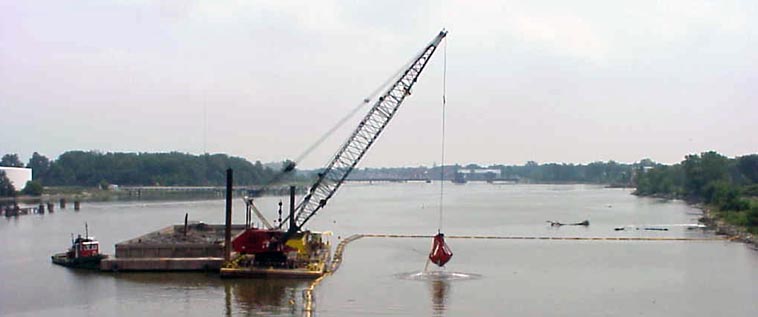Introduction
The GLRC Strategy calls for continuing the reduction and virtual
elimination of persistent toxic substances such as mercury and PCBs in
the basin, as well as preventing new toxic threats to the basin through
pollution prevention and enhanced surveillance, protecting public health
through education and outreach, and working with international forums to
address sources outside the basin. This Toxic Pollutants Initiative sets
forth a series of near term activities undertaken by members of the
Collaboration to implement those recommendations.
Activities
1. Mercury Phase-down
Strategy
A basin-wide Great Lakes mercury product stewardship strategy is
under development to fulfill the Strategy recommendation to phase down
mercury in products and waste. A workgroup of state, tribal, and city
staff was formed in April 2006 to develop the strategy. The goal is to
have a final, GLRC-endorsed strategy by late 2007. Outcomes will include
legislative and policy responses to the strategy’s recommendations and
implementation actions that will result in longer-term removal from the
basin of mercury in products and waste.
Progress to Date
2. Burn Barrel Education and
Outreach Campaign
U.S. EPA with Great Lakes states, tribes, and cities are jointly
developing an education and outreach program to address open burning
across the Great Lakes basin. This project targets local and tribal
waste management officials with:
- Education about environmental concerns associated with trash
burning;
- Information on infrastructure and alternatives to burning in
communities; and
- Tools to strengthen burning ordinances and support greater
compliance with current regulations.
Staff will present this program at meetings in all Great Lakes
states through the end of 2007. Basin outcomes will include: number of
ordinances banning burning, trash disposal alternatives implemented, and
reductions in the practice of burning garbage.
Progress to
Date
- IL/IN Sea Grant, Great Lakes states,
and U.S. EPA staff have presented information to local solid waste
management officials and others on open burning at numerous
conferences throughout the basin.
- Hundreds of Learn not to Burn kits
have been distributed. Kits are on-line at
http://www.iisgcp.org/learnnot2burn/.
3. Pharmaceutical and Electronic
Waste Disposal Education and Outreach
U.S. EPA, Great Lakes states, tribes, and cities are developing an
education and outreach effort to address pharmaceutical and electronic
wastes in the Great Lakes basin. Similar to the burn barrel campaign,
this campaign targets waste management officials with information about
pharmaceutical and electronic waste disposal and recycling policies and
options. IL/IN Sea Grant staff is attending a series of state-wide
meetings of local and tribal government officials in the Basin to
present and provide toolkits through 2007. Outcomes will include:
collection and recycling activities implemented as a result of the
campaign; pounds of pharmaceuticals collected and safely disposed; and
pounds of E-waste recycled or safely disposed.
Progress to
Date
- Toolkits have been developed with
information on: health and environmental concerns with these
wastes; current regulations on recycling and disposal; examples of
take-back programs and success stories; and a list of resources.
- IL/IN Sea Grant, Great Lakes states,
and U.S. EPA staff have presented information to local solid waste
management officials and others on pharmaceutical at numerous
conferences throughout the basin.
- Disposal of Unwanted Medicines, a
Resource for Action in Tour Community kits are on-line at
http://www.iisgcp.org/unwantedmeds/.
- An E-waste campaign is under
development for 2008.
4. Great Lakes Sport Fish Consortium Project
The Great Lakes Sport Fish Consortium, the Wisconsin Department of
Health and Family Services, and representatives of Great Lakes states
and tribes have been funded by U.S. EPA to finalize a basin-wide uniform
mercury protocol for sensitive populations. This project is developing
fish consumption outreach materials related to mercury. A final draft
protocol will be produced by the end of 2007, and basin-wide outreach
materials will be produced by the end of 2008. Outcomes will include
advisories based on the protocol. This project will consider the needs
of subsistence and commercial fishermen.
Progress to Date
- The Consortium has finalized the Protocol for Mercury-based
Fish Consumption Advice: An addendum to the 1993 Protocol for a
Uniform Great Lakes Sport Fish Consumption Advisory. The
protocol represents a workgroup consensus. However, workgroup
members did not participate as official agency representatives but
as knowledgeable and experienced individuals. Tribal and federal
representatives participated as observers.
- The protocol was presented to the Environmental Council of the
States and the Association of State and Territorial Health Officials.
- Basin wide outreach materials are currently under development.
[1] The Toxic Pollutants Initiative was endorsed by the GLRC
Executive Committee on March 2, 2007
| 

